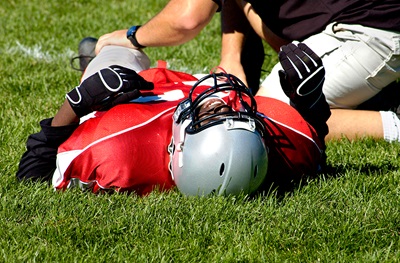
PHILADELPHIA –The majority of National Football League (NFL) running backs and wide receivers returned to play quickly after suffering a single concussion and did not experience a decline in performance from that single event, potentially masking the true significance of these injuries, according to a new study from researchers at Penn Medicine and the Henry Ford Hospital in Detroit, as well as Wayne State University and the Southern California Permanente Medical Group. While more light is being shed on the effects that concussions have on player performance, the researchers sought to examine how athletic performance was affected immediately, which has not been studied extensively. The research was published in American Journal of Sports Medicine.
"While it's most often multiple concussive events that typically result in the long-term health effects, such as early onset dementia, a single event is still significant, and single events eventually add up," said Samir Mehta, MD, chief of Orthopaedic Trauma and Fracture Care at Penn Medicine, who devised the study. "Based on our data, if a player has had a single concussive event, it does not appear to put them at risk for on-field performance issues, but it may increase the risk for future concussive events, and close monitoring of these players is still essential."
The study's lead author is Toufic Jildeh, MD, a sports medicine resident in the Henry Ford Hospital. Jildeh, Mehta, and the other researchers gathered NFL concussion data for running backs and wide receivers over four seasons (2012-2015), reasoning that players in these positions were the best to study because they had countable statistics that would directly translate to on-field performance. To measure performance, they looked at the total yards and touchdowns each player achieved to create a "power rating," which was previously established for research, to compare pre- and post-concussion performance in 38 eligible players. Players who suffered any concussions before the study years were excluded, as the researchers hoped to hone in on the effects of just one concussive event. In addition to comparing the injured players' performances to themselves, power ratings for 139 players who did not have a reported concussion were also examined.
Mehta hypothesized that players who suffered concussions would often return to the field, but their offensive output (yards gained and touchdowns scored) would suffer. Instead, formerly concussed players did not experience a significant decline in their performance once they returned to play following a single concussive event. These numbers held not just in the season that the player returned, but even three seasons after, the study showed.
"We have seen that with several other injuries, like ACL ruptures, for example, a single event can have detrimental effects on performance over time after the injury," Mehta said. "Our assumption was that a concussion would behave similarly, but I believe our results stem from the fact that a concussion does not have the same 'mechanical' effect as tearing an ACL."
The players who suffered concussions also had performance numbers that lined up with their peers who did not have a reported concussive event. However, the study did find that players who suffered concussions played in significantly fewer games than the uninjured players, though they still returned to the field relatively quickly, averaging just a game and a half out of the lineup in the 16 game season. Only five of the 38 players studied didn't return to play in the same season their concussion occurred, but this was likely due to their injury occurring during one of the last two games of their team's season. Two of the 38 players retired as a result of their concussion status.
Mehta works in trauma and, specifically, has interest in "hot" and "cold" trauma: hot meaning an injury that just happened, such a hip or leg fracture, and cold being the downstream effects that occur as a result of past injuries, such as fractures that fail to heal. As such, he believes that on-field performance following a concussion could potentially cloud how serious the injury actually is, both in the present and long-term.
"Having a single event may not have any short-term impact on player performance, but I think anyone who has suffered a concussion would say that they didn't feel 'right' after it happened," Mehta said. "I think the focus needs to be on hypervigilance after the first concussion in order to mitigate negative downstream effects."
Moving forward, Mehta believes more work can be done studying athletes who experience multiple concussions. He also believes that studies looking at more elapsed time from injuries — both in concussions and other common athletic injuries — along with big data approaches can reveal the true effects of these injuries.
In addition to Jildeh and Mehta, other authors include Kelechi R. Okoroha, MD, Kevin A. Taylor, MD, and Vasilios Moutzouros, MD, of the HFHS; Patrick Buckley, of Wayne State University; and Nima Mehran, MD, of the Southern California Permanente Medical Group.






